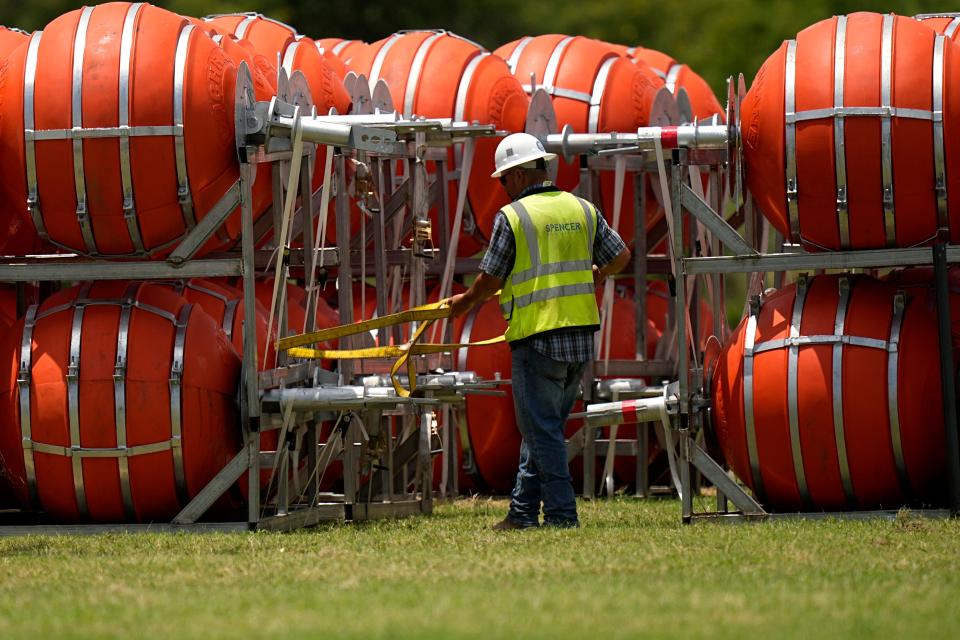Rivers and Harbors Act: How the feds plan to knock down Abbott's controversial border plan
- Oops!Something went wrong.Please try again later.
Gov. Greg Abbott, in his first public comments after being sued Monday by the federal government over his border security initiatives, dismissively suggested the U.S. Justice Department was using "some obscure statute" to undermine the state's effort to combat unlawful immigration.
But a legal scholar with five decades of experience in environmental law said that while the statute at the crux of the federal action dates to the late 19th century, it has stood the test of time and could endanger the three-term Republican governor's latest initiative at the Texas-Mexico border.
"On the face of it, the United States government has a very strong claim here," said Jim Blackburn, a Rice University environmental law professor who earned his law degree from the University of Texas in 1972.
The Rivers and Harbors Act
The federal complaint, filed in the Western District of Texas, names Abbott and the state of Texas as defendants and says that the 1,000-foot floating barrier the governor ordered to be placed in a segment of the Rio Grande near Eagle Pass violates the Rivers and Harbors Act of 1899. The law prohibits "the construction of any structure in or over any navigable water of the U.S." unless the Army Corps of Engineers signs off.
More: Texas buoy barriers: Who governs the Rio Grande?

Abbott did not seek federal approval when the buoys were deployed in early July. The governor said in a letter to President Joe Biden that Texas is within its constitutional authority to invoke a “sovereign interest in protecting (the state's) borders.” Earlier, Abbott said he has invoked the "invasion clauses" of the Texas and U.S. constitutions to justify his hardline border policies, including placing razor wire along the banks of the river on the U.S. side.
The governor also disputed the Justice Department's assertion that the string of buoys is a structure that can be likened to a wharf, dock or jetty that are prohibited under the 1899 statute.
Blackburn, the Rice University law professor, however, disagreed. He said the floating buoys that are about 6 feet in diameter and tethered by netting to the floor of the river to deter migrants from swimming underneath it would likely impede large watercraft, commercial or otherwise, looking to navigate the Rio Grande.
More: Feds sue Texas after Abbott refuses to remove floating barrier, razor wire on Rio Grande
Congress passed the Rivers and Harbors Act back when inland waterways were crucial to the nation's economy, Blackburn said.
"This goes all the way back to when people were putting up chains and barricades across rivers, and charging fees to go up the river," he said. "And that was an impedance on interstate commerce so the federal government basically gave the Corps of Engineers control over navigation."

How events led up to the federal suit
The federal government's legal challenge to Abbott's border policies comes amid pressure from congressional Democrats and immigrant rights activists who expressed outrage over reports by a Texas Department of Public Safety medic who said troopers and National Guard soldiers taking part in the governor's Operation Lone Star were being instructed to push river-crossing migrants back into the Rio Grande and to deny basic aid to those already on Texas soil.
More: Along Texas' floating border barrier, migrant children left bloody by razor wire
Those reports were followed by news accounts, along with still images and video footage, of migrants being lacerated by the coils of razor wire stretched across the riverbanks as part of the border security initiatives.
Abbott and Operation Lone Star's front-line leadership have said no directives have been issued that would physically harm migrants.

Political pits for the governor and the president
No matter how the lawsuit plays out, and it could take months before that happens, Abbott likely sits in the superior position compared with Biden from a purely political standpoint, said Cal Jillson, a Southern Methodist University political science professor.
"I think (Abbott) understands that he will lose this lawsuit eventually, that the legal merits are on the side of Biden and the DOJ," Jillson said. "But he's going to make political hay every day between now and then, particularly with the Republican base electorate."
Jillson said that since Biden took office and began rolling back the Trump administration's hardline federal policies, Abbott has successfully articulated a message that sells among conservatives united in their opposition to what they see as an unchecked surge in unlawful border crossings.
Biden, on the other hand, Jillson said, sits at the head of a party more fractured on the immigration issue, especially in Texas. South Texas Democrats, even if they blanch at reports of what appears to be a callous enforcement tactic, see firsthand the need to stem the surge of migrants crossing into the state, he said.Jillson said the Democratic administration has had difficulty crafting an immigration policy that benefits it politically, "whereas Republicans can fairly easily benefit by their border policy."
Brandon Rottinghaus, a University of Houston political science professor, said the news footage of suffering migrants, especially children, coming from the on-the-ground news coverage of the buoy controversy could shift the narrative, at least on the margins.
"I do think that there's the potential for national blowback," he said. "Especially if the images that come out of the border are graphic, and make people think that we're not being as careful as we should be with people's lives."
But he agreed with Jillson that if the Biden administration wins in court, it cannot allow the message to take root that a giant welcome mat has been placed on the Texas side of the river.
"The Biden administration has got to balance the politics this carefully," he said. "They have to show that they're not just letting a border open up to anybody, but also that they're doing their job in a reasonable and humanitarian way.
"That's a tough balance in a world where politics shapes the entirety of people's perceptions about what's going on."
This article originally appeared on Corpus Christi Caller Times: US v. Texas: Immigration lawsuit's risks for Greg Abbott, Joe Biden

